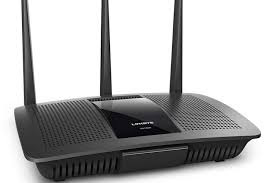what is a router in networking
In this article today learn routers the very basics so this is a wireless router right
here and remember in the scenario where the dude he gave us the cable and him
told us the basics of how to hook up our own home network he said take this
cable plug into the modem and then from the modem take an Ethernet cable stick
it in your router and then all your devices can connect your router so let's
say that we have a laptop and we wanted to you know to connect it with the
ethernet cable and also maybe our iMac can connect to our router and the router
can also sense this has wireless. For more information visit the Wikipedia page.
capabilities connect to wireless devices such
as phones tablets whatever now just by looking at this and not understanding
anything else about routers we can already see the basics of what's happening
now we see that these devices all of the devices that we have inside our home
our laptops our Macs are you know phones tablets whatever all of these devices
aren't communicating .
directly with
one another they're communicating through this central device called a router
now there are actually two main types of routers that are popular nowadays
whenever you see a router and it has antennas on it like this that means that
it has wireless capabilities and wireless devices.
you know like
tablets phones and even laptops they all have wireless cards in them and also let
me see if I could pull another one up alright now this is another type of
router and this is only a wired router so you can only connect devices that
have an Ethernet port in other words like I don't know maybe you just have a
bunch of pcs that are all connected through Ethernet and they don't have any
wireless cards .
then maybe
you just want to get a router like this and we'll talk about the benefits and
drawbacks of each one in the upcoming tutorials and I'll actually show you guys
this so this is the router that I bought for my upcoming tutorials whenever I show you guys hands on how to you
know set everything up and configure all your different devices and as you can
see since it has these little antennas right here it must mean that it supports
both wired and wireless devices.
which it does and if you look at the back of
it I'll talk you guys through this real quick this black little plug that's
just for the power this first the blue port the reason that you have one blue
and four yellow ones is because the blue port is where you take the ethernet
that's coming from the modem and you plug that into the blue port on your
router and the yellow ports these four different ports right here that is for
let's say you have four different pcs that are all wired through Ethernet and
you want to hook them up to the internet that's where you plug those in so
again there you go that's a real basic overview.
I don't want to you know give you guys too
much information and spoil up but that's the basics of what a router is and
again there are a lot more two routers than what I'm demonstrating in this article
but for right now I just want to give you guys a real broad overview and later
on whenever we take a look at more complex networks other than you know just a
really simple home network you're going to see that another job of a router is
actually to decide the best route for your data to travel so between your
computer in your home and let's say Google's web server that data can take a
bunch of different routes and whenever it gets to a router and it's going to
come across a bunch of them you know whenever it's whenever you're just going
to any website that router has to decide what path that data is going to take
and it's actually pretty cool how it decides and I'll explain all that later on
but for now just remember that a router is what all of your devices are going
to connect to and also routers join networks .
together
that's a key point if you understand one thing take that away so in other words
in this example your router is joining two networks together your home network
and the internet which is the biggest network of all so whenever you buy
internet from whatever company you decide to buy it from what they're going to
do is they're going to come to your house they're going to give you a cable and
it's going to hook up to a modem you're going to take an Ethernet and connect that to a router and all of your
advices are going to be able to connect to that router and eventually get
internet however there are some other devices for some more complex networks.
Advantages of router:
·
Routers can connect
different network architectures, such as Ethernet and Token Ring
·
Router can choose the
best path across an internetwork using dynamic routing techniques
·
Routers reduce network
traffic by creating collision domains
·
Routers reduce network
traffic by creating broadcast domains
Disadvantages of router:
hey operate based on routable network protocols.
They are expensive compare to other network devices.
Dynamic router communications can cause additional network
overhead. This results into less bandwidth for user data.
They are slower as they need to analyze data from layer-1
through layer-3.
They require considerable amount of initial configurations.
They are protocol dependent devices which must understand the
protocol they are forwarding.

No comments:
Post a Comment